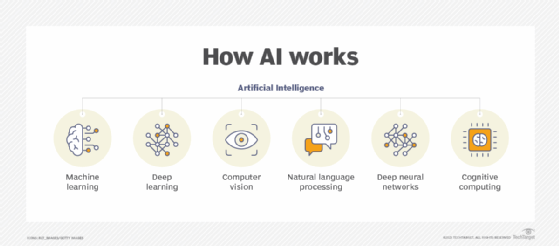
What is artificial intelligence as a service (AIaaS)?
Artificial intelligence as a service (AIaaS) is a cloud-based service that enables organizations to access artificial intelligence (AI) through a third-party offering. This lets them experiment with AI for various purposes without a large initial investment and with lower risk.
Many organizations find the upfront time and expense required to start a custom AI platform cost-prohibitive. An AIaaS platform, however, enables them to work with AI without these associated investments.
AIaaS provides out-of-the-box platforms that are easy to set up, making it easier to test various public cloud platforms, services and machine learning (ML) algorithms.
How does AI work?
AI encompasses various technologies, including robots, computer vision, cognitive computing, ML models and natural language processing (NLP).
Machine learning algorithms -- the primary tool used in AI -- are a collection of guidelines or methods that a computer generally applies to compute or solve a problem. The typical methods computers use to solve problems or provide decision-making capabilities include extensive data analysis or the creation of generalizations and statistical forecasts.
This article is part of
What is enterprise AI? A complete guide for businesses
AI systems work by analyzing large amounts of training data, combing for correlations and patterns, and using these patterns to predict future states. The training process typically requires massive amounts of data. The less data the model is trained on, the more likely it is to be biased.
AI algorithms are frequently divided into two categories: deep learning algorithms that use deep neural networks, and machine learning algorithms such as regression and classification.
AIaaS provides access to already trained and existing AI models through the cloud. This means users can quickly scale resources up or down as needed. AIaaS platforms also commonly support different data sources, meaning an organization can integrate the service with its data environment. The AIaaS provider is responsible for managing model updates, infrastructure and security.

The benefits of using AIaaS platforms
Organizations can execute AI at a reasonable cost using the AIaaS delivery model without developing or maintaining a single AI project. AIaaS platforms enable organizations to build customized AI services that are adaptable, scalable and simple to use.
The following are additional benefits of AIaaS systems:
- Quick deployment. AIaaS is one of the fastest ways to introduce AI to an organization. It's easy to install and set up. Because there are numerous AI use cases, it isn't always feasible for an organization to create and maintain an AI tool for each one. Customizable options are especially useful, as organizations can deploy AI services quickly and tweak them according to their business needs and constraints.
- Low or no required coding skills. AIaaS can be used even if a company lacks an in-house AI developer or programmer. All that's needed is a layer of no-code infrastructure in the enterprise, as generally, no coding or technical expertise is needed during the setup process.
- Cost savings. Saving money is the main factor influencing the expansion of AIaaS in the IT industry. AIaaS is cost-effective for businesses because they only pay for usage and AI functionality and don't need to make sizable upfront investments.
- Price transparency. In addition to reducing non-value-added labor, AIaaS also offers access to AI with a high level of transparency regarding service fees. Because most AIaaS pricing structures are based on consumption, businesses only pay for the AI technologies they use.
- Scalability. AIaaS is well suited for companies looking to scale. It's ideal for tasks that don't add significant value yet need some level of cognitive judgment. Because AIaaS uses industrial automation to complete simple tasks without requiring human intervention, team members have more time to focus on other tasks.
What are the challenges of AIaaS?
Although AIaaS offers many notable benefits, it also has the following challenges that organizations must consider:
- Price. AIaaS can be cost-prohibitive for many organizations, as the charges for usage and maintenance can be substantial over time. Organizations must evaluate their long-term objectives to ensure AIaaS aligns with their budget and overall goals.
- Transparency. Most AIaaS platforms provide users access to the services, but offer little to no transparency into their internal operations.
- Security. Data security is a major concern with AIaaS, as businesses must share data with outside vendors. However, data masking and other privacy-enhancing techniques are designed to safeguard an organization's data.
- Data governance. Businesses must tightly enforce limits on cloud data storage in highly regulated industries. For example, organizations in the banking and healthcare sectors might find AIaaS challenging to use because they could encounter restrictions on how data can be stored, shared and used in the AIaaS platform.
- Vendor lock-in. If one AIaaS provider isn't meeting a company's needs, it isn't easy to switch to another vendor. This is because various AI providers employ different response styles and vendor lock-in agreements. The transition might also be time-consuming for team members because they must learn the new program from scratch.
Types of AIaaS
AI provider platforms offer several styles of machine learning and AI. These variations can be suited to an organization's AI needs because they can evaluate features and pricing to see what works for them. Cloud AI service providers can offer the specialized hardware needed for some AI tasks, such as graphics processing units for intensive workloads.
The following are different types of AIaaS:
- Bots. Bots and chatbots are widely employed across all industries. They use NLP to mimic real human speech and are generally used in customer service to provide relevant answers to customers' most frequent queries. Companies save time and resources by responding around the clock and enabling employees to focus on more challenging tasks. A study conducted by AI provider Tidio found that 82% of customers would rather use a customer service chatbot than wait for human agents to respond to their inquiries.
- Machine learning. Businesses use ML to investigate and identify trends in their data, make predictions, and learn as they go. This data processing technique is intended to run with little or no human intervention, empowering businesses to employ AIaaS without specialist technical skills. ML comes in a variety of options, from pretrained models to models designed for a particular use case.
- Application programming interfaces. An API is a software bridge that enables communication between two applications. An example of this is a third-party airline booking website -- such as Expedia, Kayak or CheapOair -- that uses information from several airline databases to display deals in one convenient location. Other common uses for APIs include machine vision, conversational AI and NLP applications such as urgency detection and sentiment analysis.
- Data labeling. Data labeling is the process of annotating huge amounts of data to arrange it efficiently. It has numerous uses, such as guaranteeing data quality, categorizing data according to size and creating AI. The data is labeled using human-in-the-loop machine learning, which enables humans and machines to interact continuously and makes it easy for AI to evaluate the data in the future.
- IoT. AI processes are embedded into internet of things (IoT) technologies, also called AIoT. The goal is to create more efficient IoT operations to improve human-machine interactions, data management and analytics. In AIoT devices, AI is embedded into hardware components that are connected using IoT networks. The devices create and gather data, while the AI analyzes it to provide insights that can be used to improve efficiency and productivity.
Vendors offering AIaaS
AI platforms -- including Amazon Machine Learning, Microsoft Azure Cognitive Services and Google Cloud Machine Learning -- can help organizations determine what might be possible with their data. Before committing, organizations can learn what works and enable scaling by testing the algorithms and services of different providers. When a platform is found that scales to requirements, the resources of these large providers can back up the needed scaling with compute capacity.
According to a report from Verified Market Research, the global AIaaS market is predicted to reach $273 billion between 2024 and 2031 -- a compound annual growth rate of 45.9%. This competitive market encompasses numerous AIaaS vendors, including the following:
- Amazon Web Services. The AWS platform offers multiple cloud services and more than 200 services across the globe. It provides several products for common use cases for machine learning and AI, including Amazon SageMaker, Rekognition and Lex. Companies can streamline the ML development process with SageMaker and automate tasks such as user verification and object detection with Rekognition. Users can create voice or text chatbots using Lex.
- Anolytics. Anolytics is an AIaaS platform for data annotation that offers outsourcing services for ML and AI models.
- Google Cloud AI. Google's AIaaS offering provides many AI and machine learning tools, such as the tensor processing unit, which accelerates AI model training. To expedite the development process, Google also offers several other AI technologies, including Google Lending DocAI, which automates the processing of mortgage documents; Natural Language AI, which analyzes text and extracts information; and Vision AI, which helps create computer vision apps.
- IBM Watson. Organizations can select from various prebuilt apps from IBM Watson, including Watsonx Assistant for creating virtual assistants and Watson Natural Language Understanding for performing complex text analysis tasks. No prior knowledge of data science or machine learning is required, and developers can also create, train and deploy ML models across any cloud using IBM Watson Studio.
- LivePerson. This SaaS startup uses the LivePerson Conversational Cloud to enable the integration of systems for voice, email and messaging customer experiences. It uses intent discovery to inform brands about what their customers want.
- Microsoft Azure AI. Data scientists, engineers and ML experts frequently use Microsoft Azure machine learning and AI platforms. The cloud-based Azure Language Understanding service aids in interpreting and analyzing text. Azure offers prebuilt libraries, specialized code packages and other AIaaS offerings, including Azure AI Bot Service, AI Custom Vision and AI Video Indexer.
- OpenAI. While OpenAI is known for products like ChatGPT and Dall-E, the company lets other organizations integrate its AI models into their own products. Companies can use OpenAI's technology within their applications and services.
- SAS. This AI-driven analytics platform uses AI to handle big data and to manage and retrieve data from various sources. The company also offers services in NLP and visual data mining, and provides an easy graphical user interface through the SAS language.
- ServiceNow. The Now AIOps platform is designed to simplify IT operations. ServiceNow also offers products such as Now Vault and Security Operations for digital security.
Future of AIaaS
As the technology advances, businesses continue to find new applications for AI. Some common trends that are dictating the direction of AI and AIaaS include the following:
- More humanlike conversations. AI bots can handle more humanlike conversations. To further specialize chatbot use, unique personas can be created using data from user knowledge bases.
- Increased customization. AI services are also becoming more customizable, offering brands more options for personalizing responses based on previous user interactions and data collected.
- Reduced need for large data silos. Because vendors are training an AIaaS model, there's a reduced need for individual organizations to collect massive amounts of data. As AIaaS becomes more popular, fewer companies will need massive data sets for training purposes.
- Better accessibility. As AIaaS grows in popularity, it should gradually become more accessible to most businesses. No-code or low-code platforms should also increase the accessibility of AIaaS.
- A focus on ethical AI. There has been increasing controversy around how companies that are adopting AI technologies obtain their training data from users, AI biases, the environmental impact of AI or how AI might be implemented by companies as a cost-saving measure to help get rid of human jobs. This has sparked a growing conversation around ethical AI and how AI should be used.
Early adopters are drawn to AIaaS because it offers many benefits and is a rapidly expanding industry. Despite potential roadblocks to its development, AIaaS is predicted to be just as significant as other as-a-service products.
In many aspects, AI technology outperforms humans, but the human brain remains unmatched. Learn about the four primary types of AI and what they entail.





